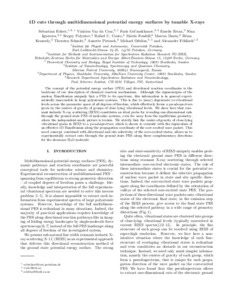One-dimensional cuts through multidimensional potential-energy surfaces by tunable x rays
Скачать файл:
URI (для ссылок/цитирований):
https://link.aps.org/doi/10.1103/PhysRevA.97.053410https://elib.sfu-kras.ru/handle/2311/111339
Автор:
Sebastian, Eckert
Vinícius Vaz, Da Cruz
Фарис, Гельмуханов
Emelie, Ertan
Nina, Ignatova
Sergey, Polyutov
Rafael C. Couto
Mattis, Fondell
Marcus, Dantz
Brian, Kennedy
Thorsten, Schmitt
Annette, Pietzsch
Michael, Odelius
Alexander, Föhlisch
Коллективный автор:
Научно-исследовательская часть
Дата:
2018-05Журнал:
Physical Review A - Atomic, Molecular, and Optical PhysicsКвартиль журнала в Scopus:
Q1Квартиль журнала в Web of Science:
Q1Библиографическое описание:
Sebastian, Eckert. One-dimensional cuts through multidimensional potential-energy surfaces by tunable x rays [Текст] / Eckert Sebastian, Da Cruz Vinícius Vaz, Гельмуханов Фарис, Ertan Emelie, Ignatova Nina, Polyutov Sergey, Rafael C. Couto, Fondell Mattis, Dantz Marcus, Kennedy Brian, Schmitt Thorsten, Pietzsch Annette, Odelius Michael, Föhlisch Alexander // Physical Review A - Atomic, Molecular, and Optical Physics. — 2018. — № 97. — С. 053410 (7)Аннотация:
The concept of the potential-energy surface (PES) and directional reaction coordinates is the backbone of our
description of chemical reaction mechanisms. Although the eigenenergies of the nuclear Hamiltonian uniquely
link a PES to its spectrum, this information is in general experimentally inaccessible in large polyatomic systems.
This is due to (near) degenerate rovibrational levels across the parameter space of all degrees of freedom, which
effectively forms a pseudospectrum given by the centers of gravity of groups of close-lying vibrational levels.We
show here that resonant inelastic x-ray scattering (RIXS) constitutes an ideal probe for revealing one-dimensional
cuts through the ground-state PES of molecular systems, even far away from the equilibrium geometry, where
the independent-mode picture is broken. We strictly link the center of gravity of close-lying vibrational peaks
in RIXS to a pseudospectrum which is shown to coincide with the eigenvalues of an effective one-dimensional
Hamiltonian along the propagation coordinate of the core-excited wave packet. This concept, combined with
directional and site selectivity of the core-excited states, allows us to experimentally extract cuts through the
ground-state PES along three complementary directions for the showcase H2O molecule.

